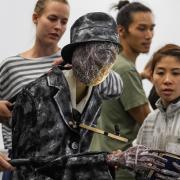Prostate cancer affects one in eight men in the UK at some point in their lives. Though awareness of the disease has grown with exposure through household names such as Robert De Niro, Sir Ian McKellen and Roger Moore, diagnosis can be complex.
Prostate cancer experts and Consultant Urologists at Nuffield Hospital Bournemouth Kevin Turner and Andrew Wedderburn explain why.
“Unlike other common cancers such as breast cancer, where there are clearly identified risk factors and specific treatments on diagnosis, prostate cancer is a very individual disease,” says Mr Turner. “It can be difficult to diagnose, as some men may present symptoms that mean they have the disease and others will have no symptoms at all. Some patients may also have symptoms that indicate prostate cancer but which may be caused by something completely different. The diagnosis of prostate cancer is a jigsaw puzzle of different elements we need to put together very carefully.
“We offer a PSA blood test, which can highlight prostate cancer - however it’s not a definite, it needs to be used in conjunction with other methods of diagnosis. An MRI scan or biopsy of the prostate can also help us to obtain an overall picture.”
Prostate cancer’s confusing symptoms and lack of identified causes mean it is essential for patients to have an individual diagnosis and treatment. Mr Wedderburn advises:
“There is also no conventional, ‘one size fits all’ established treatment for prostate cancer, but there are multiple treatments that can be tailored to individuals to be effective. In the case of a non-aggressive cancer, the side effects of having treatment may outweigh the benefits, so we may advise that no treatment is necessary. This is where we would find men such as Sir Ian McKellan explaining they are ‘living healthfully’ with the disease. However, there are some aggressive prostate cancers which affect younger men in particular and these may need to be treated aggressively.”
The consultants explain that there are three main treatments: Surgery, radio therapy and hormone therapy.
Mr Turner concludes: “Both surgery and radiotherapy based treatments have potential to provide a complete and permanent cure, though sometimes follow-up treatment is required. And a full cure is not always needed, we may just need to prevent the disease from causing symptoms.”
More information
Those who are worried about prostate cancer symptoms or are interested in finding out more about the medical options developed to fight the disease are invited to call the Nuffield Health Bournemouth Hospital’s customer services team on 01202 702830 or visit nuffieldhealth.com/hospitals/bournemouth.
***
READ ON
• How eye-tracking technology could help children who struggle with dyslexia - Dr Julie Kirkby, a Senior Lecturer in Psychology at Bournemouth University, reveals how innovative eye-tracking technology could help children who struggle with dyslexia.



























